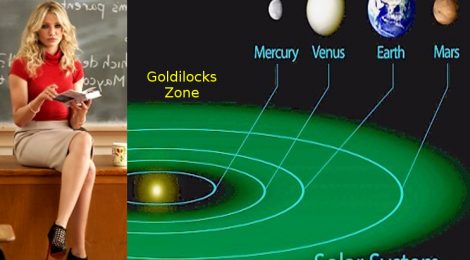
Fly The Planet
Can we fly the planet out of danger.
The Earth is presently precariously located in the tooo hot part of the Goldilock’s Zone.
Life is just barely holding on and our carboniferous climate change influence means we might be in a losing game.
So all you rocket scientists and space cadets here’s an idea that might just result in you holding the ultimate joystick when you pull over and say, “Hey baby can I give you a lift?”
If you don’t like the topic of climate change you still ought to pay attention as the Sun is becoming about 10 percent hotter every billion years. We are doomed, like frogs in a slowly heating pot of water, to boil to death if we ignore the problem and do nothing.
Might there be a way to put a ‘joy stick’ on the planet earth and fly her to safety? Let’s consider that possibility. What they heck else can we do. Maybe the billionaires of UBER or self driving Google car folk will chip in to help.
Recently with the work proving the EM Drive and it’s incredible feature of being able to push off of the quantum fabric of spacetime without the need for ‘propellants’ might just be what we need to fly the planet to safety.
Our planet at about 1 millionth the mass of the Sun is not so large as to be unmovable. We just need the thrusters. (No we cannot change the gravitational constant of the Universe.)
Let’s do the math as to how much thrust we’ll need.
OK first how far do we need to fly and how soon do we need to get there is the first equation. At our present trajectory with regard to global warming our ‘pot’ is heating pretty danged fast. In just a few human lifespans we’ve warmed dramatically and already life is suffering dramatically.
If you are a tropical coral reef unless the trip starts and ends in a cool zone in the next hundred years you are cooked. And it is not only corals that are cooked in that time frame. Recent reports of seabirds show that 70% have been recently eradicated in just 50 years or so. So for birds your goose is cooked in less than another 100 years. We humans are more resourceful and resilient so we might manage to hold on for a few more centuries.
Let’s assume we want to fly the planet to safety in the next 100 years.
What is ‘safety’? How far do we have to fly?
OK the ‘Inverse Square Law’ states that radiation, aka sunlight, diminishes with the square of the distance. Whew that helps. The earth is presently 92 million miles from the sun. If we want to drive far enough to remain at today’s comfy temperature at least we don’t have to go far.
By my calculations the earth would have to be moved approximately 567 miles (0.0000061 AU) away from the sun each year to compensate for presently recorded global warming. Out of 92 million miles that doesn’t seem like so much.
Hmmm. Doing the energy calculations given Earth is a bit, shall we say ‘portly’ this would seem to require 2.486 x 10^36 Joules of energy per year.

Saturn Five Launch Sending Apollo Astronauts To the Moon
So what kind of EM Drive or Rocket array could be used to generate that amount of thrust? A Saturn V, one of the biggest rockets ever, had a first stage thrust of 24 billion Joules (2e^9). Yikes we’d need e^27 of our largest ever rockets to do the job. I don’t think there is a word for a number that large, other than Forest Gumps ‘gazillions.’
And then there is that irksome matter about the energy. Oh oh, we humans only generate some e^20 joules of energy each year from everything we do. I don’t think we are going to up our energy generation by 16 orders of magnitude.
Oh damn it seems we, along with the frogs and goose, are cooked!
Or are we? There must be something we can do. How about working with some basic organic gardening ideas to save the planet, maybe that will help. As it happens it will as my work has proven in the world’s largest natural eco-restoration project. IT JUST WORKS.
You can read all about it as Goldilocks explains it all, just click on the photo link below.



It is probably possible to move the earth of some thousand miles with a “little” energetic expense: I suggest to change the trajectory of a medium-size Near-Earth Object. (1km of diameter)
A serie of thermonuclear explosions could change the trajectory of the asteroïd by vaporisation of his surface by the soft X-rays of the bombs. (100 Mt)
The new trajectory must graze the Earth in front of it. The attraction of the two bodies will make the asteroïd to fall in an orbit much closer to the sun, and the Earth will get energy, climbing to a new farthest orbit.
But we have not the right to made an error in our computing…
For the expend of some few megatons of fusion energy, the exchange of momentum between the earth and the asteroïde will be many order of magnitude higher.
THIS IS ACTUAL GEOENGINERING!
But i’m afraid that Greenpeace will not agree…
(Never forgot our meeting with John at Marseilles)